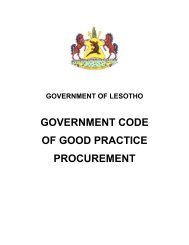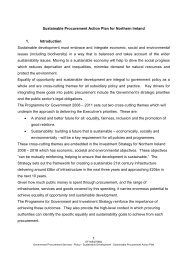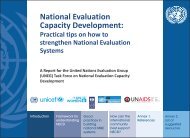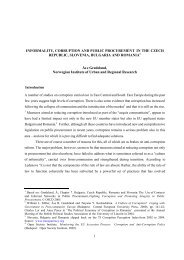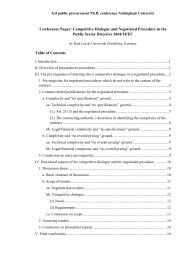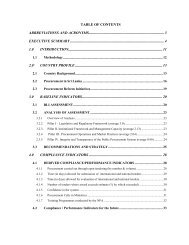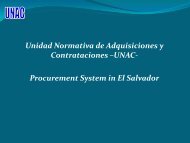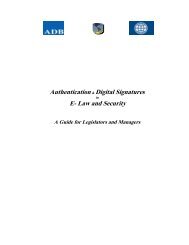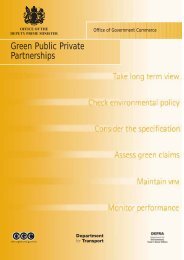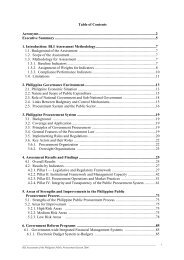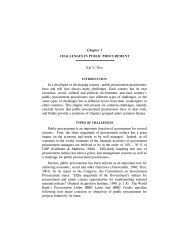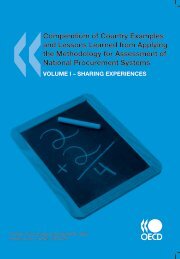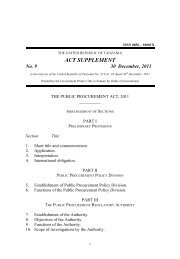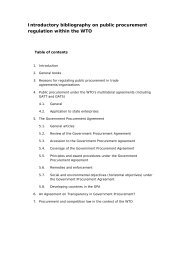The Public Procurement Rules 2008 - LGED
The Public Procurement Rules 2008 - LGED
The Public Procurement Rules 2008 - LGED
Create successful ePaper yourself
Turn your PDF publications into a flip-book with our unique Google optimized e-Paper software.
esponsive Proposals and to make the selection procedure as fair and as transparent as possible<br />
by providing information on the Proposal submission process and the evaluation criteria.<br />
(9) If a short-listed Consultant could derive a competitive advantage from having<br />
provided consulting Services related to the assignment in question, the Procuring Entity shall<br />
make available to all short-listed Consultants together with the RFP all information that would in<br />
that respect give such Consultant any competitive advantage over competing Consultants such as<br />
designs, study reports, strategy papers.<br />
(10) <strong>The</strong> ITA or ITC shall specify the Proposal validity, within the period specified in<br />
Schedule I, depending on the complexity of the assignment,<br />
provided that to suit the requirements of a particular <strong>Procurement</strong> transaction shorter or<br />
longer periods may be authorised by the Head of a Procuring Entity or an officer authorised by him<br />
or her.<br />
(11) <strong>The</strong> Procuring Entity shall prepare a realistic cost estimate in order to allocate an<br />
accurate budget to the assignment.<br />
(12) <strong>The</strong> Procuring Entity may break down the assignment into its composite tasks<br />
(activities), if applicable, with each task showing the professional fees required and corresponding<br />
Reimbursables and a contingency, if desired, to provide for both physical and financial<br />
contingencies.<br />
(13) <strong>The</strong> cost estimate prepared by the Applicant shall be based on the Procuring Entity’s<br />
assessment of the resources needed to carry out the assignment including staff-months, logistical<br />
support and physical inputs.<br />
(14) Costs shall be generally divided into two (2) broad categories -<br />
(a) fees or remuneration according to the type of Contract used; and<br />
(b) Reimbursables, in the case of time-based contracts, which are amounts<br />
payable against Documentary evidence for expenses such as air tickets, per<br />
diems, visa costs, medical expenses, transportation costs, office rental costs,<br />
purchase of vehicles, office equipment, office furniture, etc.<br />
(15) <strong>The</strong> cost of staff-months shall be estimated on a realistic basis in accordance with<br />
the level of expertise required and the desired proportion of international and national Consultants.<br />
(16) <strong>The</strong> items listed in Sub-Rule (14)(b) as reimbursable expenditures are examples only<br />
and shall vary according to the TOR and, in particular, the facilities to be provided to the<br />
Consultant by a Procuring Entity or user or beneficiary entity;<br />
Example<br />
If a Procuring Entity or user or beneficiary entity can provide office equipment,<br />
vehicles or both then there shall be no need for an Applicant to include those items<br />
in its estimate of costs.<br />
(17) <strong>The</strong> only actual fixed cost quoted by an Applicant in its Proposal is the fee rate or<br />
remuneration to be charged for its personnel to undertake the assignment.<br />
(18) For certain specific Services, such as for pre-shipment inspection, <strong>Procurement</strong><br />
Agency Services, training of students in institutes or universities, advertising activities in<br />
privatisation or twinning, the Procuring Entity may need to adjust the formats or tables in the<br />
Standard RFP Document issued by the CPTU.<br />
(19) Applicants shall be given at least the minimum time for preparation of Proposals<br />
99



